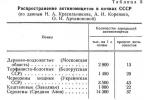Collection of proverbs of the peoples of the world about the MotherlandStudent of the 7th grade Zakharova Anastasia
A proverb is a short folk saying with an instructivecontent. For example: Don’t spit in the well, you’ll need to drink the water.
A proverb is a small sentence that represents
element of folk art, which includes a complete,
instructive and well-formed thought. Proverbs by structure
the sentences are very rhythmic and sonorous due to the use of rhyme
(consonant endings), alliteration (repetition of the same
consonants) and assonance (repetition of identical vowels).
Proverbs about the Motherland emphasize ardent love for one’s land, for
to their people, they often convey longing for their native land during
a person's stay in a foreign land.
Russian proverbs: “A mother is not afraid to die for her Motherland”; “Everywhere is good, but at home it’s better”; "A man without a homeland is like a family without
Russian proverbs“Your mother is not afraid to die for her Motherland”; "Everywhere
good, but home is better"; "A man without a homeland, what
a family without land."
The meaning and significance of proverbs and
sayings about the homeland, that without
love for the fatherland is impossible
full existence
person, because there will be no one without it
strong and strong country where your
homeland You need to hold on dear
sides and don’t forget about yours
roots And then you'll be proud
his homeland. If you will be
respect your homeland, then others
will do this.
Karelian proverb It’s warm overseas, but the houses are warmer
In the meaning of this proverb we see that home is a place where spiritual life reigns.warmth and comfort.
Indian proverb: “A fool is captured in his homeland” “The homeland is where you feel good.”
Every person has a place where they are loved, expected, and believed in.Mordovian proverb: In your native land, it’s like in paradise
This proverb says that in another country it may be good, butwhere you live, where you were born, is the best!
Belarusian proverb: The native land is like a bed for the weary.
On native soil, i.e. at home, and sleep better, and live better. NativeThe land is native, you won’t feel good in a foreign land.
Georgian proverb Love for the Motherland is the highest human dignity
Considering this proverb, we can come to the conclusion that love forThe Motherland is in each of us. She is in us from birth, she is in us from our
fathers and grandfathers.
Thus, after analyzing the proverbs of different peoples of the world, we can come to the conclusion that all people, regardless of their place
residence, the image of the Motherland is always associated withsuch concepts as home, family, love,
devotion and courage. Attitude towards native
earth determines the honor and dignity of any
person.
Kolyada, Kolyada!
Give me some pie
Or a loaf of bread,
Or half a buck,
Or a chicken with a crest,
Cockerel with a comb,
Or a bunch of hay,
Or a pitchfork to the side.

Carol- New Year's solemn song in honor of the owners of the house. Carolers - singers (most often teenagers) wanted to receive gifts for singing. If the owners did not give alms, they were reproached for their stinginess.



Proverb is closely connected with the spiritual, moral and historical experience of not only Russian people, but also all peoples of the world. It is connected with the work, life and culture of people.

Your own bread is better than someone else's pilaf

Write the proverb in your notebook and determine its meaning. Indicate which words determine whether the proverb belongs to a particular culture. Choose a Russian proverb with a similar meaning.
An evil tongue destroys mountains

Write the proverb in your notebook and determine its meaning. Indicate which words determine whether the proverb belongs to a particular culture. Choose a Russian proverb with a similar meaning.
And Confucius was not always lucky

Write the proverb in your notebook and determine its meaning. Indicate which words determine whether the proverb belongs to a particular culture. Choose a Russian proverb with a similar meaning.
summary of other presentations“Plural nouns” - Form the singular from the plural. Features of education. Nominative case in plural. Name the city. What is the name of the largest mountain range on the Kola Peninsula? Plural of a noun. Test. How right. Check yourself. People, subsoil. The name of the first Russian village. Number of nouns. What are shoe covers? Handling the language somehow means thinking poorly.
“Russian language “Gender of nouns”” - Updating knowledge. Determine the gender of these nouns. Is it always easy to determine the genus? Let us repeat the definition of the gender of nouns. Correct the mistakes. Solve the “equations” by choosing cognate nouns instead of X. "Third wheel". Exercise. Gender of inflected nouns. Gender of nouns.
“Russian language “Lexical meaning”” - Selection of synonyms. Explanatory dictionaries. Selection of cognate words. Fireworks. Orange. Check yourself. Ways of explanation. Moral. Lexical meaning. Fragrant fruit. What is shown in the picture. Boy. What do these words have in common? Synonyms. Lexical meaning of the word. Meaning of the word. Casket.
“Vowels in case endings of nouns” - Cases of a noun. Learn to write case endings correctly. Combine. Say the word. Let's get acquainted with the endings of nouns. Russian language lesson in 5th grade. Steamboat. Declension. Check yourself. Observation. Spelling of vowels in case endings of nouns. Vocabulary work. Find your place. Declension of nouns. Dialogue between two students. Fill in the missing words.
““Verb” 5th grade Russian language” - Inconstant signs. Notes The concept of a verb. Table of verb conjugation endings. Verb moods. Returnability. Verb tenses. Constant signs. Plan. Runs is a verb. Ways to form a verb. Conjugation of verbs. Sample of morphological analysis. Verb conjugation is the change of the verb in persons and numbers. Walks - verb. Impersonal verbs. Transitive and intransitive verbs. Verb.
“Separation of the subject and predicate dash” - Moscow. Grammar basis. Earth. Subject and predicate. Report. Copy the words. Dash. Dash in a simple sentence. Dash between subject and predicate. Fill in the missing letters. Ways of expressing the subject.
MAOU "Omutinskaya Secondary School No. 1" Proverbs and sayings.
The work was completed by: a student of grade 2 “a”
Panova Nastya
Head: primary school teacher
Becker V.A.

Hypothesis.
- The secret of the popularity and vitality of proverbs and sayings lies in their inextricable connection with the life and experience of the people.


Proverbs and sayings were created by the people. They teach what a person should be,
what qualities he should have.
Proverbs and sayings give useful advice to a person.

“You can’t spoil porridge with oil” Russians say “I made porridge, so don’t spare the lard,” the Ukrainian will say
This is what they say if someone does a lot of good or useful things. And this proverb was born like this... Porridge is the Russian national food. In Rus' they often ate porridge with butter. The more oil in the porridge, the tastier it is. Then the proverb acquired a second, figurative meaning.

“You can’t catch a fish out of a pond without effort”
“You can’t catch a fish out of a pond without work,” that’s what they say when you need to achieve something, but first you have to work hard for it.

“To eat a fish, you have to go into the water” sounds in Ukrainian.
And in the Tatar language they say
“You can’t catch a hare without work”

“If you chase two hares, you won’t catch either”
This is what they say when someone takes on several things at once and therefore cannot do any of them well or complete them.

"The apple never falls far from the tree"
This proverb is used when they notice that a child is behaving like this the same as his parents.

Ukrainians have this proverb:
“As are the roots, so are the seeds.”
And the Germans say:
“Like a tree, like a pear”

Proverbs of the peoples of the world.
When an innocent person suffers, the Arabs say: “The sea and the wind quarreled, but the boat suffered.”
“The word is silver, and silence is gold,” a Russian will say, and a Bengali: “Whoever talks a lot begins to lie.”
"Look at yourself three times a day" day.” This Japanese proverb teaches you to monitor your behavior.

Russians say: “Don’t dig a hole for someone else, you’ll fall into it yourself” And the Ossetians: "Don't throw stones from a glass house"

Task: match the Russian proverb with a foreign proverb.
The language will take you to Kyiv.
Being a guest is good, but being at home is better.
Tears of sorrow will not help.
The morning is wiser than the evening.
Whether it's East or West, home is better.
He who does not ask will not get lost.
One hour in the morning is better than two in the evening.
There's no use crying over spilled milk.

Assignment: continue the proverbs .
and he keeps looking into the forest.
learn forever.
love to carry sleighs too.
than never.
one answer.
No matter how much you feed the wolf,
Live forever
Do you like to ride
Better late
Seven troubles

Conclusion:
As a result of our research, we came to the conclusion that proverbs and sayings teach a person the right actions and are inextricably linked with the life of the people. Their wisdom, brevity, figurativeness, and ability to be applied to different occasions in life make them indispensable in the linguistic culture of all peoples.
Description of the presentation by individual slides:
1 slide
Slide description:
“Comparative analysis of proverbs and sayings of different nations.” Completed by Alexandra Molodova, a student of grade 8 “N” at MBOU School No. 42. Samara Scientific supervisor Naida S.G., teacher of Russian language and literature Regional scientific and practical conference “From idea to scientific research” Section “World artistic culture” Topic: Samara, 2013
2 slide
Slide description:
What are proverbs? Proverbs are one of the small genres of folklore. For centuries, our ancestors preserved and passed on folk wisdom from mouth to mouth, which “taught the mind to reason.” The older generation taught the younger generation and warned them against possible mistakes. With proverbs and sayings they conveyed their accumulated life experience. In ancient times, people actively used proverbs and sayings, because it was part of their culture.
3 slide
Slide description:
The goals and objectives of my work: to learn how proverbs and sayings of different peoples of the world reflect their way of life, worldview, national culture and traditions; identify the common and different in these proverbs and sayings through comparative analysis; classify the object of study; Conduct a practical study on knowledge of proverbs and sayings using the example of your class.
4 slide
Slide description:
Comparative analysis of proverbs of different nations. There is no rose without thorns. (Russian) - There is no lotus without a stem. (Indian) From love to hate there is one step. (Russian) - Blind devotion is not far from infidelity. (Japanese) Patience and work will grind everything down. (Russian) - Over time and with patience, the mulberry leaf will become satin. (English) Every family has its black sheep (Russian) - In every herd you will find a black sheep. (German) Need will teach you to eat rolls. (Russian) - Poverty will teach you to play the violin. (German) Velvet paws hide sharp claws. (English) - Lays down softly, but sleeps hard. (Russian) Poverty is not a vice. (Russian) - Poverty is not a sin. (English) You can’t even pull a fish out of a pond without difficulty. (Russian) - Without labor there is no reward. (German) Man proposes, but God disposes. (Russian) - The Lord helps sailors in a storm, but the helmsman must stand at the helm. (German) Don't look a gift horse in the mouth. (Russian) - Don't look a gift chick in the mouth. (Ind.) Make a fool pray to God - he will even break his forehead. (Russian) - Trust the donkey with the vineyards. (Ind.) The apple doesn’t fall far from the tree. (Russian) - As is the Raja, so are his subjects. (ind.)
5 slide
Slide description:
They do not look at a given horse's teeth. (Russian). A woman with a cart makes it easier for a mare. (Russian) The two most useful books for a girl are her mother’s kitchen book and her father’s checkbook. (American)
6 slide
Slide description:
There is no lotus without a stem. (Indian) As is the Raja, so are his subjects. (Indian) The apple doesn’t fall far from the tree. (Russian)
7 slide
Slide description:
In a chain of synonymous proverbs, one, as a rule, is more common and has taken root better in our language. We see the same phenomenon of synonymy in the proverbs of other peoples of the world. Small blows also fell large oaks. (English) - Only the stubborn can do this. (English) Fish without fish and cancer. - In the field there is also beetle meat. - In the dark even the rotten thing shines (Russian)
8 slide
Slide 9
10 slide
Slide description:
Proverbs about love and friendship. Until you sacrifice your soul, you will not find your beloved. (Kurdish) Where there is no love, there is no joy. (load.) Separation for love is like the wind for fire: weak love extinguishes, but great love fans. (Spanish) If love is over, it never began. (Heb.) In love, one always kisses, and the other only turns his cheek. (French) Dry wood is easy to dig, feigned love is easy to part with. (Mong.) An old friend is better than two new ones. (Russian) A friend is not always a good one who considers your truth to be a lie. (Taj.) Where friendly speech will bring benefit, we should not use gold and sword. (pers.) A friend is closer than a brother. (African) They are not friends with the wolf. (Armenian) A fence between friends prolongs friendship. (English)
11 slide
Slide description:
Conclusion. In my work, I came to the conclusion that proverbs and sayings have much more in common than they differ. There are thousands of proverbs in the languages of different nations, but all of them can be divided into thematic groups. And then the similarity of thinking of people of different nationalities is undeniable - we simply often operate in our speech with different concepts, because the realities around us are different and the way of life is not the same.
12 slide
Slide description:
Questioning. Objectives: to identify the children’s knowledge of proverbs and their mastery; check the work of associative thinking associated with the selection of proverbs from the languages of different nations; arouse students' interest in this area of human culture.
Slide 13
Slide description:
Proverbs for group No. 1. The first group had to find Russian equivalents for 6 foreign proverbs. Russian proverbs were not given. The son of a leopard is also a leopard (African). If the lady gets off the carriage, it will go faster. (English) Once the cork is removed, you need to drink champagne (French) A leisurely elephant will reach the goal earlier than a frisky stallion. (Vietnamese). The squirrel jumps very quickly, and sometimes breaks loose (Indonesian). Cotton is not friendly with fire. (Afghan)




